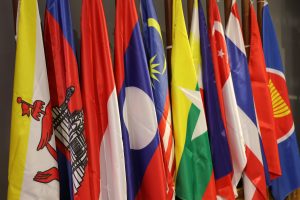Cambodia, the current chair of the Association of Southeast Asian Nations (ASEAN), has postponed a meeting of the bloc’s foreign ministers, after some ministers had expressed “difficulties” in attending.
The meeting, which was scheduled to be held in Siem Reap on January 18-19, will be indefinitely delayed, foreign ministry spokesperson Koy Kuong told reporters, according to Reuters. “The postponement is because many ASEAN ministers are having difficulties to travel to join,” he said, but did not respond to questions about which nations’ ministers were unable to attend.
The postponement, which has started Cambodia’s ASEAN chairmanship off on the worst possible foot, is almost certainly related to the bloc’s divisions over how to deal with the situation in Myanmar, which remains steeped in crisis following the military’s seizure of power last year. In particular, it likely signals some member states’ displeasure with Cambodia’s decision to invite Wunna Maung Lwin, the junta’s foreign minister, to the upcoming foreign ministers’ retreat.
Since taking over the chairmanship late last year, Cambodia’s government has made clear its view that direct engagement with Myanmar’s military administration is the best path forward, jettisoning the more robust approach that ASEAN settled on last year under Brunei’s chairmanship. This involved a resolution to exclude the junta’s political representatives from ASEAN meetings barring the implementation of a Five-Point Consensus peace plan agreed by the bloc’s leaders last April.
Last month, however, Cambodian Prime Minister Hun Sen stated that the military administration of Myanmar, as a member of the ASEAN “family,” should be included in the bloc’s meetings. Hun Sen then followed this up with a two-day trip to Myanmar for talks with coup leader Senior Gen. Min Aung Hlaing, the first visit by a foreign leader since the military seized power in a coup last February.
Hun Sen’s trip was widely protested within Myanmar and by many regional and international observers, who claim that it has bestowed legitimacy on the military government and dashed international efforts to isolate it, without securing any meaningful concessions in return.
Sure enough, the trip yielded no immediate breakthroughs on the implementation of the Five-Point Consensus, except vague promises from Min Aung Hlaing. At the same time, it signaled Cambodia’s acceptance of the military junta; a joint statement issued after the meeting described Min Aung Hlaing as “prime minister” of Myanmar. As the Twitter account for Myanmar’s Civil Disobedience Movement put it, “The only outcome from the trip was more legitimization of a failing murderous regime.”
The nations that have been most supportive of the junta’s exclusion from ASEAN meetings – these included Indonesia, Malaysia, the Philippines, and Brunei – have been privately opposed to the Cambodian approach.
In a polite but pointed reminder ahead of Hun Sen’s trip last week, Indonesia’s President Joko Widodo said that Indonesia’s position remained unchanged: “Should there be no significant implementation of the consensus,” Jokowi wrote on Twitter, “Myanmar should only be represented by non-political level at ASEAN meetings.”
At the same time, other nations have lined up behind Cambodia’s pro-engagement stance. According to a statement issued following his visit to Vietnam earlier this week, Lao Prime Minister Phankham Viphavanh reportedly “expressed support for the role and effort of Samdech Techo Hun Sen, Prime Minister of Cambodia, to explore ways and means to address the situation in Myanmar.” Vietnam and Thailand were also known to have been skeptical about the harder line advocated by Indonesia and Malaysia, and presumably support Phnom Penh’s present stance.
From outside the region, China’s foreign ministry has similarly said that it will “fully support” Cambodia “playing an active role and making an important contribution” to dealing with the Myanmar crisis, while Japanese Foreign Minister Hayashi Yoshimasa commended the “progress” made during Hun Sen’s visit to Myanmar.
The postponement signals the extent to which Myanmar’s crisis has opened up deep fissures within ASEAN, running cleanly along the region’s mainland-maritime divisions. At the same time, the choice to exclude Myanmar from ASEAN meetings was in many ways a sign of the bloc’s impotence in the face of the Myanmar military’s bloody obduracy. Even if the bloc was united on this point, there is little reason to believe that it would lead to sudden progress in resolving a conflict in which the military has shown no intention of compromising with its opponents.
As the long-time Myanmar watcher Bertil Lintner noted in an article for The Irrawaddy in August, neither isolation nor engagement has historically proven effective in shifting the political calculus of the Myanmar military. “Myanmar’s military rulers have always had their own agenda and don’t listen to people outside their own inner circle, regardless of what outsiders say or do,” he wrote.
All this poses a thorny problem for ASEAN: Myanmar’s coup has posed the bloc a credibility test that it has little hope of passing.
































